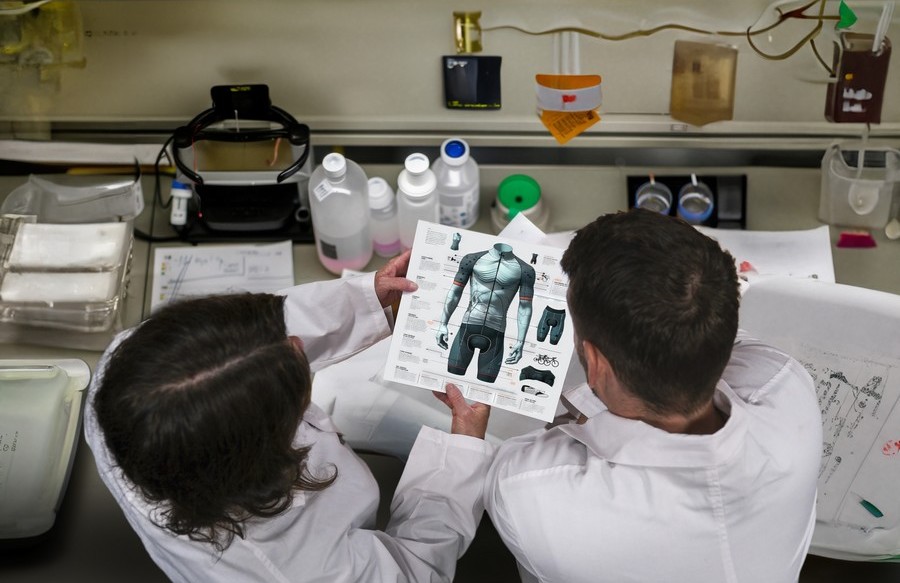Scion’s central role in €7.5 million research project
Scion’s capability has been recognised globally by world-leading partners.
Scion’s leading biomaterials, 3D printing, packaging, and machine-learning knowledge is being called on as part of a €7.5 million (NZD$13.25m) research project funded in partnership with the European Union.
In January, the EU’s key research and innovation funding programme, Horizon Europe, awarded the funds to a four-year project led by INRAE, France’s National Research Institute for Agriculture, Food and Environment.
Starting in May, the project brought together 15 partners from seven countries. Scion plays a central role and will contribute approximately NZD$3m worth of research.
The research programme, UPWEARS, aims to develop a sustainable e-textile (electrically-conductive textile) using cork, hemp, flax and paper byproducts, and develop ways to recycle and reuse textile waste. The overall aim is to contribute to a sustainable economy by unlocking the potential of bio-based and hybrid fabrics.

To demonstrate the e-textile, the team is working to create high-performance clothing for biking that is abrasion and tear-resistant, waterproof or repellant, stretchable, and breathable. The product will also be biodegradable. This will be tested in Scion’s biodegradation facility.
Scion’s expertise in sustainable electronics is being used to create flexible sensors from biomaterials for integration into the clothing, sending temperature and humidity data to a user’s device. Scion will lead in turning recovered textile waste into filament or pellets for 3D printing meaning the clothing will be recyclable and a zero-waste product. And Scion will help use AI/machine learning to optimise the production process, reducing waste and increasing zero-defect products.
Overall, the project will help with the transition to a modern textile fabrication process using natural fibres and reducing waste during and post-production.
According to the EU, the textiles industry is responsible for water pollution through things like dyeing and laundering, and responsible for 10% of global carbon emissions. End-of-life waste is a huge problem and tackling textile waste goes towards achieving a circular economy.
The UPWEARS project will further enhance our visibility on the international stage through our ongoing commitment to innovation in this field. - Sofiane Guessama
Capability recognised globally
New Zealand signed an association agreement with Horizon Europe in February 2023 allowing it to access Horizon Europe funding.
Scientists Dr Yi Chen and Dr Marie-Joo Le Guen are leading Scion’s science team. Chen says involvement in the bid came after the establishment of the International Associated Lab for biobased products, LIA BIOMATA, in 2023 forming a partnership between Scion and INRAE and providing a framework for developing larger partnerships.
“Scion has been developing sustainable biosensors and using AI for forestry and packaging applications, and this technology translates to a variety of applications such as wearable devices. It is fantastic that our capability is recognised globally by world-leading partners. This success is a tangible outcome of the collaborative efforts over the past year with INRAE and the strong connections established through being an International Associated Lab.”
While Horizon Europe funding is mostly for projects that will further the EU on the world stage, Chen says the work benefits New Zealand by attracting leading researchers and state-of-the-art technology and raising our profile with future international collaborators.
Some of the project’s goals include substituting at least 50% of synthetic materials and using natural fibres from 100% local EU suppliers. The production process aims to reduce water and chemical use and carbon footprint. Scientists are developing bio-bleaching techniques, using cork coating for stability and antibacterial properties, flax for flexibility and hemp for mechanical resistance.
Dr Alec Foster, Scion’s Bioproducts and Packaging portfolio leader, says work like this helps progress a circular bioeconomy and being involved in such a globally significant project is a privilege for Scion.
“To be one of the first in New Zealand to be a Horizon partner, and to also play such a central role in a substantial consortium, is a fantastic achievement and exemplifies the tremendous opportunity Horizon Europe presents for our country.
“The cross-fertilisation of ideas and knowledge with some of the world’s foremost experts in the field is the best way to achieve a circular bioeconomy and make a global impact.”
He says being part of such a transformative project with European partners “underscores Scion’s commitment to making a significant and positive difference in the world with new technologies”.
MBIE and Horizon Europe are supporting Scion’s involvement in the project.
The cross-fertilisation of ideas and knowledge with some of the world’s foremost experts in the field is the best way to achieve a circular bioeconomy and make a global impact. - Alec Foster
INRAE researcher Sofiane Guessasma says UPWEARS proves change towards sustainable products while improving individual wellbeing is possible. Sustainability does not mean sacrificing lifestyle.
“UPWEARS leads the way towards a viable transition by addressing challenges about resource depletion, reduction of chemical use and promotion of high value bio-based products.”
He says UPWEARS contributes to the 2030 INRAE vision of building a sustainable future through shared science and innovation.
“Scion has been a key partner of INRAE for many years, particularly in the development of sustainable materials from bio-based resources. The recent establishment of the LIA BIOMATA has strengthened the collaboration with an increased visibility of our shared strengths in this field.
“The UPWEARS project will further enhance our visibility on the international stage through our ongoing commitment to innovation in this field.”
The research involves organisations, universities and textiles companies from France, Sweden, Portugal, Italy, Belgium and the United Kingdom covering the technical e-textile value chain, from fibre to prototype manufacturing and testing, as well as stakeholder engagement and market analysis.
